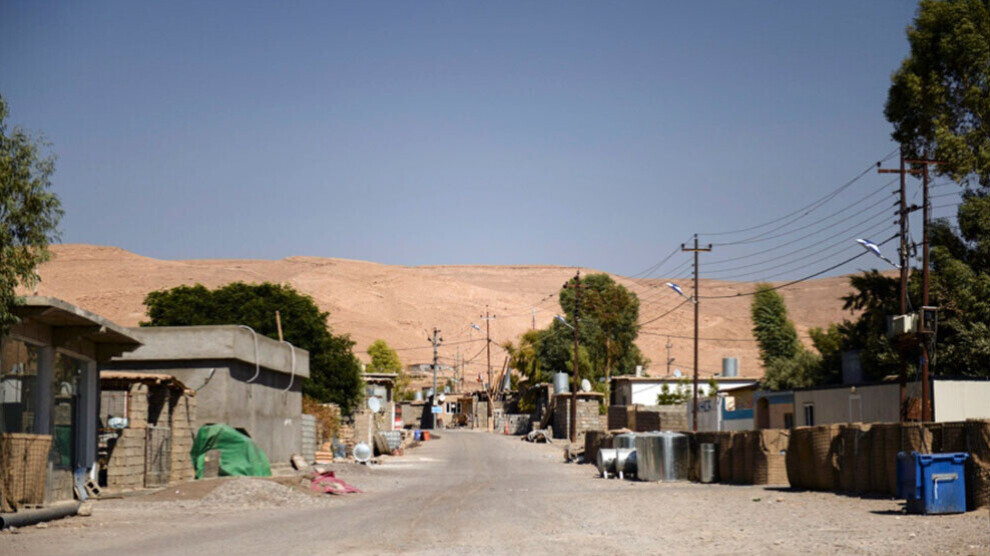The Turkish plan to attack the Maxmur Refugee Camp
Baxtiyar Çelê, member of the People's Council of the Democratic Self-Administration in the Maxmur refugee camp in southern Kurdistan (northern Iraq) summarizes the situation on the ground for ANF.
Baxtiyar Çelê, member of the People's Council of the Democratic Self-Administration in the Maxmur refugee camp in southern Kurdistan (northern Iraq) summarizes the situation on the ground for ANF.

The Maxmur (Mexmûr) refugee camp in South Kurdistan has always been a target of attacks by numerous hostile-minded forces since its establishment in 1998. In recent days, statements by representatives of Turkey's fascist power elite, such as Turkish Defense Minister Hulusi Akar, have once again made the people of Maxmur an important part of the political agenda.
The Maxmur camp itself is not much bigger than a small town. The reason that the population there is exposed to such massive and permanent attacks lies in the self-organization of their lives along the lines of Abdullah Öcalan's ideas. This is because, with their system of democratic autonomy, they have the great potential to strongly influence the neighboring peoples. The attacks on Maxmur are thus a result of the fear of the Democratic Self-Administration model. Turkey and its local collaborators massively attack all places where the Democratic Autonomy model is put into practice. They do this because they know that this model influences and is positively received by the other peoples in the region. Since Maxmur is an important part of this system, it is a prime target of Turkish attacks.
Today's population of Maxmur was forced to leave their villages at the beginning of the 90's due to the spread of terror and fear by the Turkish state through torture, the policy of 'disappearance' and other inhuman measures. They fled from their homeland - the villages located on the peaks of the Zagros Mountains in the regions of Botan and Hakkari - to South Kurdistan. For 27 years, Maxmur’s population has been subjected to uninterrupted pressure and has now turned resistance to the constant attacks into a way of life. They have always avoided depending on the charity of others and insisted on solving their own problems themselves. Thus, they have since preserved their democratic autonomous position and transformed it into a way of life.
The current attacks on the South Kurdish regions of Metina, Zap and Avaşîn are primarily directed against the guerrillas of the Kurdistan Freedom Movement. However, Şengal (Sinjar) and Maxmur have also been repeatedly mentioned by Turkish state representatives in recent weeks as targets of future Turkish attacks. The reason for this is that both places have many other democratic human characteristics in addition to those described above. The Maxmur refugee camp is also located in a geographically central area. Located on the slopes of Mount Karacox, in close proximity to the Arab population and at equal distance from the three important cities of Mosul, Kirkuk and Erbil, Maxmur represents a kind of bridge through which the camp's model can be spread throughout the region. For this reason, the Turkish state and its local collaborators are afraid of the Maxmur refugee camp, although it is so small.
If we recall the projects initiated at the international level for the Maxmur area, it becomes clear that the region plays the role of a central transit route. This has once again significantly increased the importance of the region. Maxmur is in close proximity to areas that are part of the Chinese project of a `new Silk Road' and a railroad line planned by Turkey, which is part of its neo-Ottoman occupation plans in the region. Due to this, it is strongly expected that attacks on the region will increase, places like Şengal and Maxmur will be permanently put on the agenda as pretexts for such attacks, and thus will be subject to direct attacks.
On May 13, Turkish Defense Minister Hulusi Akar publicly threatened attacks on Maxmur and Şengal. It is noteworthy that Akar's threats followed directly on the heels of news that Iraqi security forces would in the future conduct joint operations with the military forces of the KRG (Kurdistan Regional Government) – allegedly against the Islamic State (IS). These recent statements make it clear that Maxmur’s resistant population will continue to face a wide variety of challenges in the future.
The fascist Turkish state and its local collaborators will continue to view Maxmur solely as a problem. The population of the refugee camp, however, considers itself a community whose fate is completely merged with the Kurdish question. It firmly believes that only the solution of the Kurdish question can provide a solution to Maxmur’s problems. The people of Maxmur have already made great sacrifices in the past for the solution of this question. In the future, they will continue to contribute to the solution of the Kurdish question in a variety of ways.